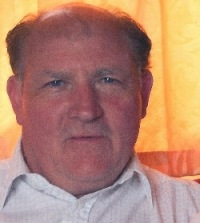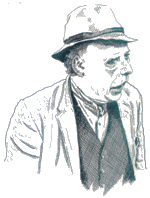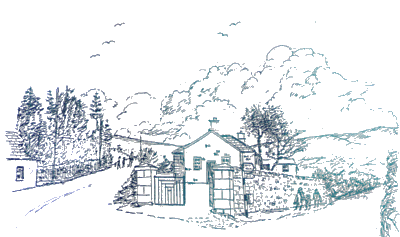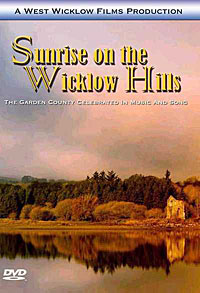
Mattie Lennon
info@mattielennon.com.
Mattie Lennon was born in the first half of the last century at Kylebeg, Lacken, Blessington, Co. Wicklow. He was not at any stage called "the black sheep of the family" mainly because he was (and is) an only child. His earliest memory is of 13th January 1949 .....
On Monday, January 10th, 1949, I attained the age of three. I donĂt remember it, but I do recall Thursday 13th, it was the Fair-Day in Blessington. When I awoke it was very dark. I made my way into the kitchen, attracted by the yellow glow of lamplight; my feet sensitive to the change of surface as I stepped from the concrete floor of the ˘upper room÷ to the granite paved kitchen. It was not night but morning; a fact proclaimed by my fatherĂs apparel as he sat on a low stool at a military-style bench which on this occasion served as a breakfast table.
The Primary Cert, my first attempt at growing side locks and the felling that my initial nocturnal adventure into Soho was in some way repugnant to Catechism teaching are all a sort of psychedelic jumble in my brain. Most memories have become blurred on the screen of time, but superimposed there and in no way distorted is my first picture of that big man, with greying hair, eating home-cured rashers from a maidenhair fern plate. The kitchen was devoid of a clock, but he threw the odd glance at the key-winder pocket watch which hung from a bent oval nail on the second shelf of the dresser. (Years later, during one of my unsuccessful attempts at horology I dismantled the faithful chronometer and having reassembled it, had parts left over; Nothing was learned from the operation except that it had been repaired in 1899). When he had mopped up the last drop of grease with a crust of home-made bread, I was to witness a scene that I would see repeated a thousand times. He took each of his boots in turn and placed a couple of small red coals inside each. Then, expertly, he rocked them from heel to toe several times. He replaced the coals in the fire, laced each boot firmly and stamped his feet on the hearth as if to test it.
A full pipe was tamped with his index finger and reddened with a paper spill lit from the glass-bowled oil lamp which stood at his right elbow. My mother often talked of trimming and filling oil-lamps in the house of gentry, yet she hardly ever succeeded in cutting this lamp wick straight across. The result was a diagonal flame.
˘His pipe is filled, heĂs ready÷ Then, he took the reins out of the ponyĂs winkers that hung by the open fire, under the ˘tillage÷. With the rope he made a head collar, went to the cow house and led out the ˘white head cow÷. The name was not a misnomer; she was a big red animal, with a white forehead adorned by two sturdy unmatching horns. I was seeing her for the first time; having sprinkled her with Holy Water, from a jam-dish on the windowsill and making the Sign of the Cross on himself, he brought her to the road. The predawn hue was giving way to daylight. It was already bright enough to see the silhouetted paling posts and the stark contour of Black hill and the stable.
A rat raced across the road. A neighbour cycled past on his way to work. Friendly salutations were exchanged. My mother ushered me back to bed. My first recordable day had begun.
He spent the first 25 years of his life at home on a small farm. He claims to identify with Patrick Kavanagh's "burgled bank of youth" (and says he is one of the few of his generation who knows how to make a bush-harrow). As a young fellow whenever he was blamed in the wrong he would compose a derogatory ballad about his accuser. There weren't many false accusations so he wasn't very prolific.
He was nicknamed "the Poet" but emphasises that the term wasn't always complimentary. He agrees that what is said behind ones back is their standing in the community and his favourite quotation is a comment made about him by a neighbour: "Wouldn't you think someone would tell him he's an eejit, when he doesn't know himself".
He has spent most of the last thirty years in Dublin but when asked "Will you ever go back to Kylebeg"? the answer is always Joycean. When James Joyce was asked, in Trieste; "Will you ever return to Dublin?" he said; "I never left".
Mattie Lennon has written articles (mostly humorous) for The Sunday Independent, The Irish Times, The Irish Post, Irelands Own, Irelands Eye, Kerry's Eye, The Wicklow People, The Leinster Leader as well as numerous on-line publications.
He claims that he was once told; "You have the perfect face for radio" and he compiled and presented his own programmes in the "Voiceover" series on RTE Radio One. He has presented ballad programmes on KIC FM and is currently doing a Sunday morning ballad show on Radio Dublin 100FM
This year he co-presented the Saint Patrick's Day Ceol na nGael programme on WFUV 90.7 in the Bronx. He also does pre-recorded programmes for other stations. One such programme is "The Story And The Song" in which he plays a number of ballads, having first told the story behind each one.
He still writes the occasional ballad (not all of them fit for human consumption).
PICTURES:
(Top)
"Mattie's father Tim Lennon (RIP) from whom he inherited the ability to amuse, immitate, and annoy in whatever he does."

(Bottom)
Schoolhouse at Lacken, Co. Wicklow by Brendan Scally - 1990, of which Mattie says, "Lacken National School ... was my only academy." 
A more recent project for Mattie is ĹSunrise on the Wicklow Hillsĺ a DVD, directed by Julie Phibbs, commemorating four hundred years since the inauguration of Co. Wicklow. The County is depicted through ballads, stories and breathtaking scenery, and Mattie's role in it is singular, where he both narates segments and serves as a tour guide for the presentation. See also www.westwicklowfilms.com

Type
Month
Year
Title
Article
March
2002
Article
April
2002
Column
May
2002
Article
June
2002
Column
June
2002
Article
July
2002
Column
July
2002
Column
August
2002
Column
September
2002
Poem
September
2002
Column
October
2002
Poem
October
2002
Poem
October
2002
Column
November
2002
Article
December
2002
Column
December
2002
Column
January
2003
Column
February
2003
Column
March
2003
Column
April
2003
Column
May
2003
Poem
May
2003
Column
June
2003
Column
October
2003
Column
November
2003
Column
December
2003
Column
January
2004
Column
February
2004
Article
March
2004
Column
March
2004
Column
April-May
2004
Column
June
2004
Column
August
2004
Column
October
2004
Article
December
2004
Column
January
2005
Column
February
2005
Column
March
2005
Column
April
2005
Column
May
2005
Column
June
2005
Column
July
2005
Column
August
2005
Column
September
2005
Column
October
2005
Column
November
2005
Column
December
2005
Column
January
2006
Column
February
2006
Column
March
2006
Column
April
2006
Column
May
2006
Column
June
2006
Column
July
2006
Column
August
2006
Poem
August
2006
Column
Sept & Oct
2006
Poem
Sept & Oct
2006
Column
December
2006
Column
January
2007
Column
February
2007
Column
March
2007
Column
April
2007
Column
May
2007
Column
June
2007
Column
July
2007
Column
August
2007
Column
September
2007
Column
October
2007
Column
November
2007
Column
December
2007
Column
January
2008
Article
February
2008
Column
February
2008
Column
March
2008
Column
April
2008
Column
May
2008
Column
June
2008
Column
June
2008
Column
July
2008
Column
August
2008
Column
September
2008
Column
October
2008
Poem
October
2008
Column
November
2008
Column
December
2008
Column
January 2009
2008
Column
February
2009
Column
March
2009
Column
April
2009
Column
May
2009
Article
June-July
2009
Column
June-July
2009
Column
August
2009
Column
September
2009
Column
October
2009
Column
November
2009
Column
December
2009
Column
January 2010
2009
Column
February 2010
2010
Column
March
2010
Column
April
2010
Column
May and June
2010
Column
July
2010
Column
August
2010
Column
September
2010
Column
October
2010
Column
November
2010
Column
December
2010
Column
January 2011
2010
Column
February
2011
Column
March
2011
Column
April
2011
Column
May
2011
Column
June
2011
Column
July-August
2011
Column
September
2011
Column
October
2011
Column
November
2011
Column
December
2011
Column
January 2012
2011
Column
February
2012
Column
March
2012
Column
April
2012
Column
May
2012
Column
June
2012
Column
July
2012
Column
August
2012
Column
September
2012
Column
October
2012
Column
Holiday 2012
2012
Column
January 2013
2012
Column
February 2013
2013
Column
March 2013
2013
Column
April
2013
Column
May
2013
Column
June
2013
Column
July
2013
Column
August
2013
Column
September
2013
Column
October
2013
Column
November
2013
Column
December
2013
Column
January
2014
Column
February 2014
2014
Column
March
2014
Column
April
2014
Column
May
2014
Column
June
2014
Column
July
2014
Column
August
2014
Column
September
2014
Column
October
2014
Column
November
2014
Column
December
2014
Column
January 2015
2014
Column
February
2015
Column
March
2015
Column
April
2015
Poem
April
2015
Column
May
2015
Column
June
2015
Column
July-August
2015
Column
September
2015
Column
October
2015
Column
November
2015
Column
December
2015
Column
January 2016
2015
Column
February 2016
2016
Column
March
2016
Column
April
2016
Column
May
2016
Column
June
2016
Column
July
2016
Column
August
2016
Column
September
2016
Column
October
2016
Column
November
2016
Column
December
2016
Column
January
2017
Column
February 2017
2017
Column
March 2017
2017
Column
AprMay
2017
Column
June
2017
Column
July
2017
Column
August
2017
Column
September
2017
Column
October
2017
Column
November
2017
Column
December
2017
Column
January 2018
2017
Column
February 2018
2018
Column
March
2018
Column
April
2018
Column
May
2018
Column
June
2018
Column
July
2018
Column
August
2018
Column
September
2018
Column
October
2018
Column
November
2018
Column
December
2018
Column
January 2019
2018
Column
February
2019
Column
March
2019
Column
April
2019
Column
May
2019
Column
June
2019
Column
July
2019
Column
August
2019
Column
September
2019
Column
October
2019
Column
November
2019
Column
December
2019
Column
January 2020
2019
Column
February
2020
Column
March
2020
Column
April
2020
Column
May
2020
Poem
May
2020
Column
June
2020
Column
July
2020
Column
August
2020
Column
September
2020
Column
October
2020
Column
November
2020
Column
December
2020
Column
January2021
2020
Column
February 2021
2021
Column
March
2021
Column
April
2021
Column
May
2021
Column
June
2021
Column
July
2021
Column
August
2021
Column
September
2021
Column
October
2021
Column
November
2021
Column
December
2021
Column
January 2022
2021
Column
February
2022
Column
March
2022
Column
April
2022
Column
May
2022
Column
June
2022
Column
July
2022
Column
August
2022
Column
September
2022
Column
October
2022
Column
November
2022
Column
December
2022
Poem
December
2022
Column
January 2023
2022
Column
February
2023
Column
March
2023
Column
April
2023
Column
May
2023
Column
June
2023
Column
July
2023
Column
August
2023
Column
September
2023
Column
October
2023
Column
November
2023
Column
December
2023
Column
January 2024
2023
Column
February
2024
Column
March
2024
Column
April
2024
Column
May-Jun
2024
Column
July
2024
Column
August
2024
Column
September
2024
Column
October
2024
Column
November/December
2024
Column
January 2025
2024
Column
February
2025
Column
March
2025
Column
April
2025
Column
May
2025
Column
Jun-Jul
2025
Column
August
2025
Column
September
2025
Column
October
2025
Column
November
2025
Column
December
2025
Column
January 26
2025
Column
February
2026


